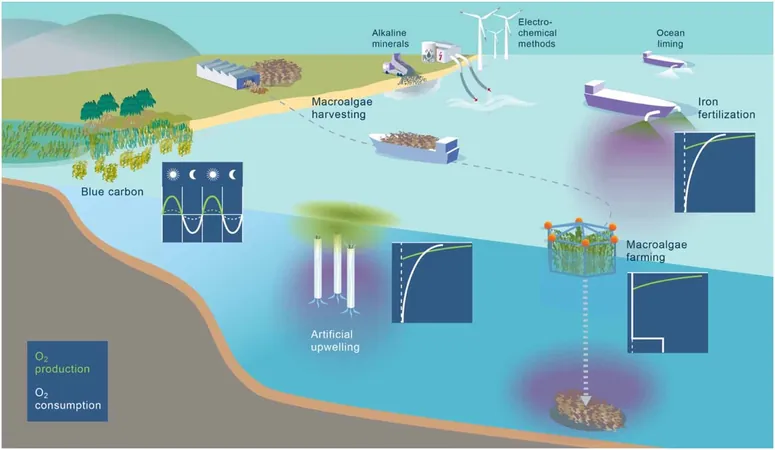
Could Carbon Dioxide Removal Methods Make Ocean Oxygen Loss Even Worse? Study Raises Alarm!
2025-06-14
Author: Sarah
Exploring the Dark Side of Carbon Dioxide Removal
As the world grapples with the escalating climate crisis, researchers are investigating methods to enhance the ocean's ability to absorb carbon dioxide (CO₂). Yet, a new study warns that some of these strategies could significantly worsen the ongoing loss of oxygen in our oceans, raising urgent questions about their viability.
Groundbreaking Research Unveils Alarming Findings
An international research team, led by Prof. Dr. Andreas Oschlies from GEOMAR Helmholtz Center for Ocean Research Kiel, has released a striking analysis on the impact of marine carbon dioxide removal (mCDR) techniques on global ocean oxygen levels. Their findings, published in the journal Environmental Research Letters, reveal a troubling connection between these methods and the alarming trend of ocean deoxygenation.
A Crisis Unfolding Beneath the Waves
Global warming has led to a staggering 2% loss of oxygen from the world's oceans over recent decades, wreaking havoc on marine ecosystems. Despite the assumption that climate mitigation measures would alleviate this issue, the study indicates many proposed mCDR methods—particularly those relying on biological processes—might actually exacerbate the oxygen loss.
Biological Carbon Capture: Double-Edged Sword?
"What benefits the climate doesn't necessarily benefit the ocean," warns Prof. Oschlies. Through advanced global model simulations, the team assessed both the direct impacts of various mCDR approaches on oceanic oxygen levels and their indirect effects tied to climate mitigation strategies.
Critical Methods Under the Microscope
Among the most concerning mCDR techniques identified are ocean fertilization, large-scale macroalgae farming followed by biomass sinking, and artificial upwelling of nutrient-rich deep waters. These methods boost photosynthetic biomass but lead to oxygen-depleting decomposition in the ocean's interior, mirroring the global rate of deoxygenation caused by warming.
The Shocking Conclusion: More Harm Than Good?
Prof. Oschlies asserts, "Methods that increase biomass production and lead to oxygen-consuming processes can’t be considered safe climate solutions." Their models suggest that these approaches could lead to oxygen reductions 4 to 40 times greater than the gains expected from cutting CO₂ emissions.
Geochemical Solutions: A Safer Bet?
In contrast, geochemical mCDR methods, like enhancing ocean alkalinity through the addition of alkaline substances, show minimal impact on oxygen levels. Interestingly, only large-scale macroalgae farming with biomass removal has the potential to increase oceanic oxygen. However, it’s important to note that this method’s nutrient removal could negatively affect overall marine productivity.
Urgent Call for Monitoring Ocean Oxygen Levels
These disturbing revelations prompt calls for mandatory oxygen monitoring in all future mCDR research and implementations. Prof. Oschlies emphasizes, "The ocean is a complex system under immense pressure. We must tread carefully, ensuring our interventions don't further threaten marine ecosystems upon which life depends."
The Bigger Climate Picture: A Wake-Up Call
As nations like Germany aim for net-zero emissions, carbon dioxide removal strategies are increasingly considered essential. However, the ocean's role as a major player in the global carbon cycle highlights the necessity of responsible methods that prioritize both climate and marine health.




 Brasil (PT)
Brasil (PT)
 Canada (EN)
Canada (EN)
 Chile (ES)
Chile (ES)
 Česko (CS)
Česko (CS)
 대한민국 (KO)
대한민국 (KO)
 España (ES)
España (ES)
 France (FR)
France (FR)
 Hong Kong (EN)
Hong Kong (EN)
 Italia (IT)
Italia (IT)
 日本 (JA)
日本 (JA)
 Magyarország (HU)
Magyarország (HU)
 Norge (NO)
Norge (NO)
 Polska (PL)
Polska (PL)
 Schweiz (DE)
Schweiz (DE)
 Singapore (EN)
Singapore (EN)
 Sverige (SV)
Sverige (SV)
 Suomi (FI)
Suomi (FI)
 Türkiye (TR)
Türkiye (TR)
 الإمارات العربية المتحدة (AR)
الإمارات العربية المتحدة (AR)